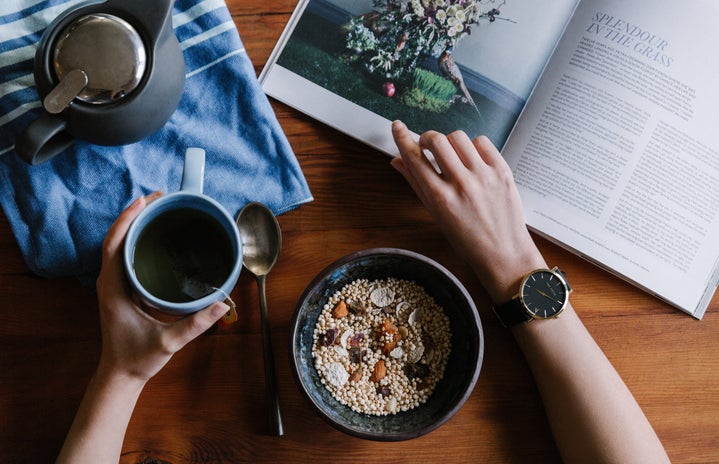There is plenty written about the value of an evening routine to allow for a better sleep. However, emerging studies are showing that establishing a consistent morning routine filled with healthy behaviours is a great way to move more efficiently through your day.
If you’ve found that an evening routine has contributed towards a more peaceful sleep, get curious as to whether a morning routine will have the same benefits; maybe helping you find some stability, and to maintain physical, emotional, and mental health during stressful times.
The first step towards creating this routine is taking time to consider how much time you have. If you have a very limited amount of time in the morning, there is no need to cram a variety of activities and tasks into this small window of time – as that will likely only cause more stress. Your first step should be to, firstly, identify your biggest stressors as you move through your morning, and then, you can assess how forming a habit could alleviate this.
In truth, there is no perfect morning routine. After all we all have individual needs and preferences. What might work for me, might feel burdensome for you and visa versa. However, by exploring some of the building blocks of mental health friendly morning routines detailed below, you can experiment with incorporating new or more consistent elements to enhance your well-being. As always when reading tips about nurturing your mental health, take what works for you, leave what doesn’t.
Make your bed
Although this may sound like something your parents might say, there is psychological evidence backing the importance of making your bed each morning.
Regardless of whether you have 10 minutes or an hour in the morning, you always have time to do this – so if you only take one suggestion from this article, allow it to be this!
As Navy admiral William H. McRaven said, “If you make your bed every morning, you will have accomplished the first task of the day. It will give you a small sense of pride, and it will encourage you to do another task and another and another. And by the end of the day, that one task completed will have turned into many tasks completed.”
At first, when I began doing this, it was simply…pleasant. A tidy bed allowed me to find it easier to keep the rest of my room clean, which is always good for stress levels. However, in time, this practice grounded me and served as a guidepost for other good habits. This is supported various studies which have positively correlated this action with an overall brighter mood. I can’t recommend giving this a go more.
Let light in
Even if you are having a slow morning due to a late night out, or a lack of an early class, allow yourself to wake up gradually with natural light.
Exposure to an abundance of light first thing in the morning increases feelings of wakefulness, and can clear feelings of grogginess and inward worries. Opening your blinds or curtains could be a good step to take if you struggle with feeling drowsy and lacking in energy when you wake.
If you are a naturally early riser who finds it difficult waking up in the dark winter mornings, devices called sunrise clocks might be worth looking into. By imitating natural light, they allow you to waking you up gently by simulating dawn, rather than to the harsh and sometimes disorientating light from a standard bulb.
Avoid technology
You’re not alone if you check your phone first thing in the morning. 4 out of 5 people check their phone within 15 minutes, and 3 out of those 5 are scrolling in less than 5.
If you charge your phone by your bed and use it as your wake-up alarm, it is all too easily to fall into the trap of having that quick update, be that of notifications or news, to catch up on what’s been going on in the world in the hours you were asleep. Not only does spending time hooked within algorithms erode time and decrease productivity, but it can also increase symptoms of anxiety and depression. When we spend more time focussing on ourselves and our inner world, rather than on those apps we feel so inclined to check that sell us something else, we can increase personal sense of being enough.
As with all of these tips, you don’t have to see them as constricting rules. Just see what benefits your wellbeing most. With this tip, perhaps consider cutting down on the time you spend on your phone in the morning, or delaying it until you have done a few other activities. Doing so may help increase your mental clarity and sense of purpose for the day while shielding you from external information which may contribute to a low mood.
Hydrate
According to a study published in Nutrition Reviews, dehydration can negatively impact brain function. Due to the majority of us waking up a little dehydrated after sleep simply (due to have gone a fair few hours without rehydrating liquids), having some sips of water first thing in the morning should help improve cognition and mental clarity. Dehydration has also been linked to tiredness, low mood and irritability.
While adequate hydration alone is not going to heal any serious and enduring mental health issues, chronic dehydration will not make those conditions any easier to manage. Thus, drinking some water upon waking is likely to be beneficial to just about all of us.
Nourish
As with hydrating, getting energy into your body to eat is essential. Intaking something within an hour of waking can stabilise blood sugar levels and mood, lower cortisol and possibly evening reduce depression
Eating something that you enjoy the taste of, and when possible, incorporating complex carbs, fat and some protein, will not only boost your mood, but will increase your energy levels to allow you to get on with morning activities.
If you don’t routinely have time for breakfast, you might plan and prepare your meals ahead of time so that a nourishing option is always available to grab on the go.
Creating a morning routine shouldn’t feel like a chore. Accommodate more behaviours into a schedule that works for you. A few new, realistic incorporations to your day are really worth experimenting with for a consistent period, because putting your wellbeing on the top of your to-do list is something you should always be seeking to do more of.


